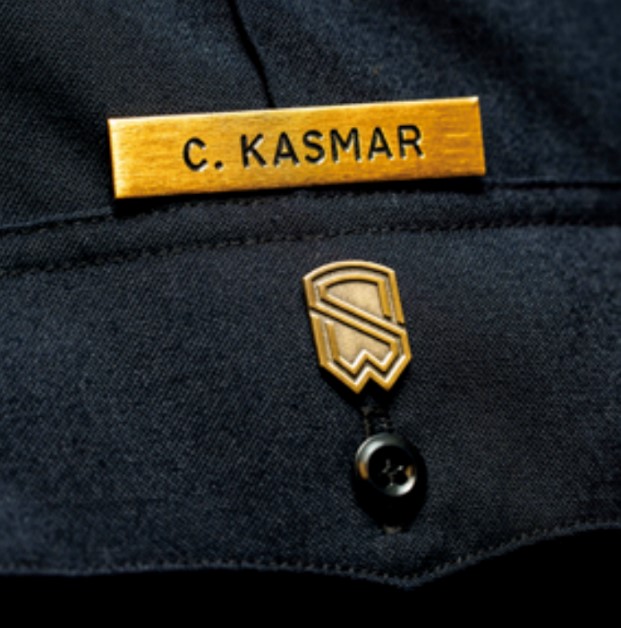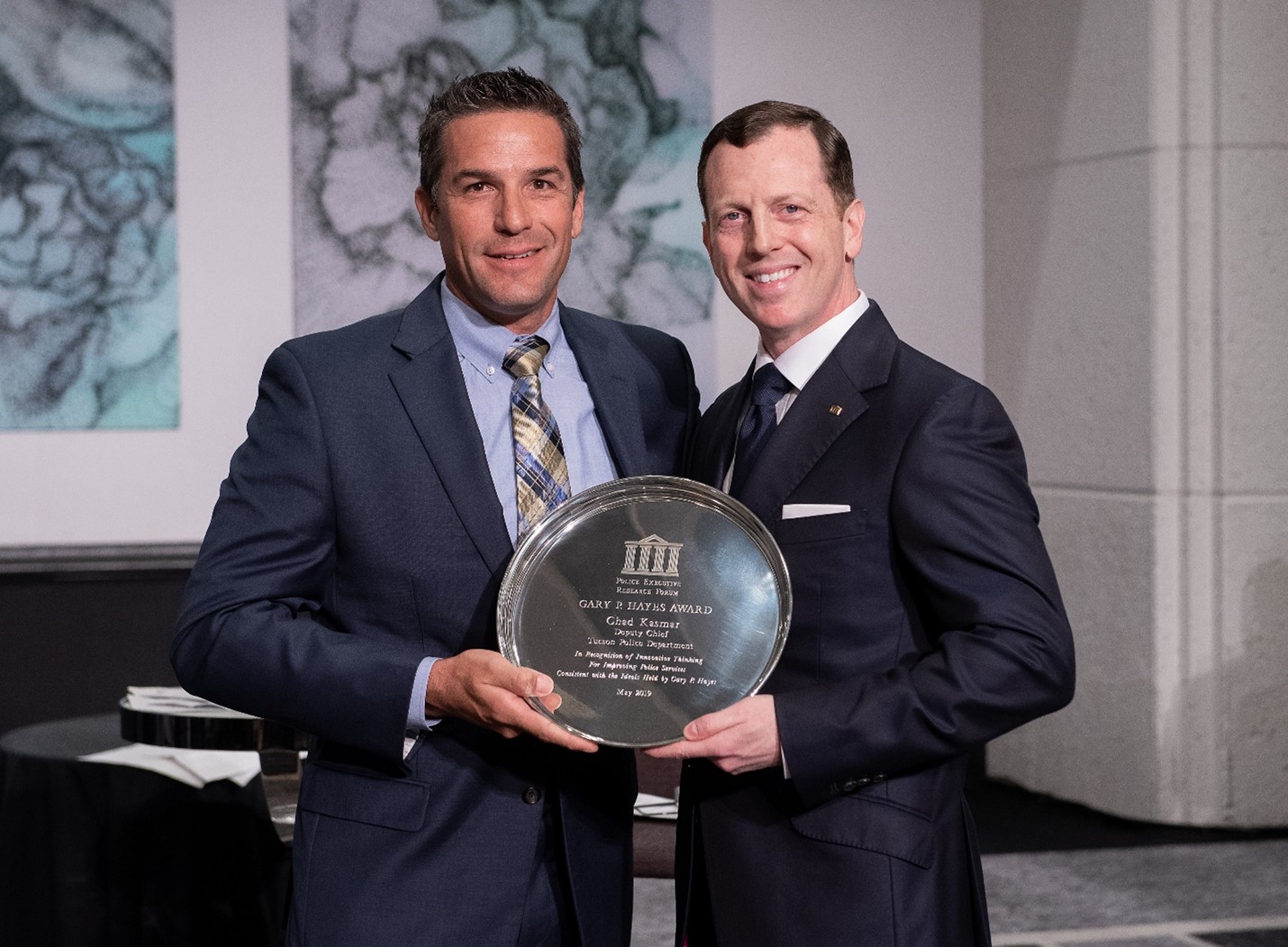|
August 10, 2024 Tucson Chief Chad Kasmar on cultivating strong leaders and TPD’s “Struggle Well” program
PERF members, Chad Kasmar joined the Tucson Police Department in 2000, rising to serve as its chief of staff by 2015. In 2016, he became the agency’s deputy chief, and in 2021, he served as the interim director of the city’s Public Safety Communications Department. In December 2021, he was sworn in as the city’s police chief. Chief Kasmar received PERF’s 2019 Gary P. Hayes Award, which honors a mid-career leader in the policing profession, in recognition of his work implementing TPD’s Critical Incident Review Board. I spoke with Chief Kasmar this week, and our conversation is available as a podcast:
The written excerpts below include the portions of our conversation about how TPD has created a culture that produces strong leaders, TPD’s wellness program, and why Chief Kasmar loves being the police chief in Tucson. In addition to those topics, the podcast includes discussion of his year leading the city’s emergency communications department, TPD’s efforts to address staffing shortages, and TPD’s approach to training and first-line supervision. This transcript was edited for conciseness and clarity. Chuck Wexler: Two of your assistant chiefs [were recently appointed to be chiefs in other cities] – Kevin Hall became chief in Spokane and Chris Dennison in Boise. It’s not every day that two of your people go on to be chiefs in pretty good-sized cities. . . . Tell me how things have evolved in Tucson in terms of developing this environment of leadership. Chief Kasmar: I think it goes back multiple generations of chiefs. It started with Chief [Richard] Miranda, then went to Chief [Roberto] Villaseñor, and then, of course, Chief [Chris] Magnus, who I was second-in-command for for about six years. So I’ll give a lot of credit to the last three generations of chiefs before I took over. But certainly Chris. Chris was brought in to be a change agent chief and really evaluate where the department was and where it needed to be. This was after Ferguson but before George Floyd. And that was tough. We had not had an outside chief in a long time. Chris is a reform-minded chief, and he was not afraid to ask the tough questions. He created a culture, and there were a couple things that I think were foundational. One, he taught us to ask why. Why have we always done it this way? . . . He taught us to think creatively about the way that we do the work. I think he also made it safe to try things and be innovative and not be afraid to fail.
Tucson Assistant Chief Chris Dennison (right) was selected as the next Boise chief of police. (Source: Tucson Police Department)
Tucson Assistant Chief Kevin Hall (left) was named as the next Spokane chief of police. (Source: Tucson Police Department) Wexler: Sometimes a reform-minded chief will come in, and when they start asking a bunch of questions, they get resistance as opposed to collaboration. How do you overcome that? Chief Kasmar: I was the chief of staff at the time. . . . It wasn’t an easy transition, and there was a ton of resistance. I think the driver of the resistance is the emotional response to when I ask you why you’ve been doing something and you’ve dedicated two decades or three decades of your life to doing it, you automatically assume that I’m telling you you’ve been doing it wrong. That’s why I don’t like the word “reform.” In my community, I’m trying to move past the word “reform” to “progression.” Life progresses. We don’t buy a reformed phone or a reformed car. We buy the evolution of that device. I am proud of our profession and how we’ve responded to the changing landscape of expectations with, frankly, a lack of significant investment from the local, state, or federal level, in many cases, to support that change. How Chris offset it, I think, was that he invested in us. What I mean by that is, for one, he taught us how to make consensus-based decisions. When we were making tough decisions on a Monday or Tuesday morning in the executive leadership team, Chris knew the outcome he wanted. It would have been much quicker for him to just say, “Hey, I thought about it over the weekend, and on these three things, this is the direction we’re headed.” But that doesn’t teach people how to make those difficult decisions. And so we began, at that leadership level, consensus-based decisions. Everybody got a say, but by the end of what was sometimes a short conversation [and sometimes] a super painful three-hour conversation, everybody had to be on board and everybody had to run with that decision like it was theirs. And I think we’ve continued that. I had the opportunity to leave TPD for a year and go be the interim emergency communications director. . . . I got to continue to hone those skills as a director myself, and that’s one of the biggest things that’s gone into preparing our assistant chiefs for these chief positions. You’re never ready to be a chief until you become one. But the foundation of skills has been built with the challenges that we face in our community, which are large. They’ve gotten that repetition of making and contributing to those hard decisions. Now, they haven’t had to own them as the chief of police, but they’ve done a great job of owning them as assistant chiefs. I think that’ll prepare them for those big decisions in their organizations.
Chief Kasmar at Tucson’s 2023 Martin Luther King Jr. Day March (Source: Tucson Police Department) Wexler: Are you losing people to surrounding agencies? Chief Kasmar: Not at the rate that we saw. We’ve decreased attrition by almost 50 percent by really rethinking how we invest in the staff. Fair compensation and appropriate equipment are absolutely foundational to a healthy, happy employee. But what we’ve really focused on the last two-and-a-half years is creating a wellness division. We partnered with [the] Boulder Crest [Foundation]. We really rethought [this] after three suicides, two that happened in ’21 in Chris’s last year, and one that happened when I was chief with a retiree who I grew up with on the department. They just had a catastrophic impact on our organization. And although we had a full-time department psychologist for years and two sergeants who would support them, the reality is that in 2021 we had over 80 homicides and over 50 traffic fatalities. So the amount of trauma that the staff is exposed to is extremely high. We recognized the rucksacks were getting full, and when the rucksacks get full from all the trauma exposure, [people] become callous. And when they become callous to survive, that’s when we start seeing some of the problems that we see across the country and we’ve seen here locally. So we created a wellness division. We put that wellness division under the deputy chief, who reports directly to me. The Office of Professional Standards and the [Public Information Officer] and Wellness all report up directly through the chief’s office. I think that’s important for leaders across the country to think about. Show me your [organizational] chart and I’ll show you your priorities. We do a “Struggle Well” class with Boulder Crest. [We do] one class a month where we have 25 public safety team members – fire, communications, and TPD, commissioned and professional staff – where they go through a weeklong Struggle Well class. I open up every class. . . . That investment in our employees, where we build trust and connection and give them skills to recognize what post-traumatic growth is, has been instrumental in the culture shift of the department. Chief Kasmar’s Struggle Well pin. (Source: Tucson Police Department) Wexler: That’s a weeklong class? That’s almost unprecedented, isn’t it? Chief Kasmar: It is. And I open the class, and part of the class is called “disclose.” It’s sharing a story, whether it’s your personal life or work life, that’s had a deep impact on you, that maybe you’ve been harboring. It’s through sharing those lived experiences that you actually enrich other people’s lives and you normalize struggle. . . . I typically share a story about addiction in my family, or losing my father, or the loss of Officer Buckner – all those are super impactful things in my life. . . . I’m a morning person, so I come in full of energy, and I’m exhausted after a 45-minute talk with a class on a Monday morning. Because I’ve not gotten through one of those conversations yet – talking about my loss and my life and how that’s shaped how I live my life moving forward – without having to compose myself. The feedback I get on every class is “the chief made it safe.” Then, by the end of the week, the assistant chiefs go in and hear recommendations from the class on what we can continue to do to grow and push what wellness looks like in our organization.
Chad Kasmar receives PERF’s 2019 Gary P. Hayes Award from then-Camden County, NJ Police Chief and PERF President Scott Thomson Wexler: What is the best part about being the police chief in Tucson? Chief Kasmar: I worry that a Monday will come where I don’t want to go to work. I can retire anytime I want, and I’m here because I love the work and I’m passionate about it. . . . It’s deeply personal work. I’m the third generation in Tucson and raising the fourth. When I retire one day, hopefully in Tucson, I want to look at my work and go, “Wow, my life’s work mattered. I’ve contributed to creating several generations of leadership that can run this organization.” I think there are times when you need an outside chief’s perspective. I think there are other times where this work is really complex, and when you bring in outside chiefs, you can reset, good or bad, the work and the momentum that’s been going on. The way I describe that to my team is [that] it’s like building an elaborate sandcastle on a beach every day, and then the tide comes in at night, when you go to bed. And you come in the next day and that beach is smooth again, and all of your work is gone. I’m not doing all this work because I want that to be reset the day after I leave. I want to contribute to work, and set up structure, and be part of decision-making across my city, which includes trying to influence what happens in the county. . . . That’s what makes me excited. I have a horrible gene that I inherited from my mother that I love to fix things, whether it’s classic cars, home remodels, or police organizations. I think this is where my art degree comes in. I can look around and see a vision of what I think something should look like before some other folks can. And then I love charting out a map to execute on that vision, and I think that’s what gets me to work every Monday. Source: Tucson Police Department Thanks to Chief Kasmar for taking the time to speak with me. I encourage everyone to listen to the podcast interview, which includes more of our conversation. Have a wonderful weekend! Best, Chuck |






